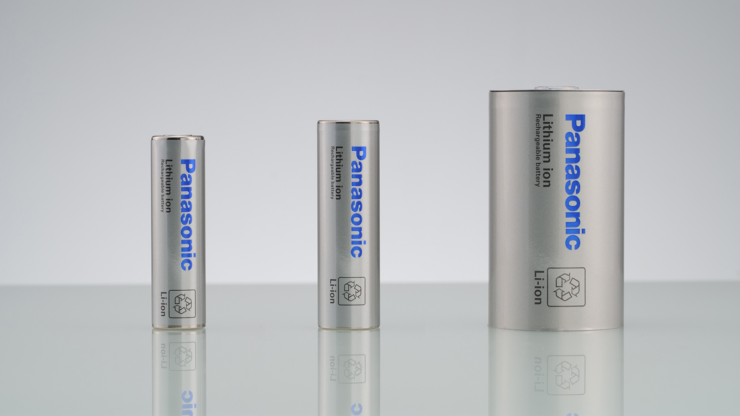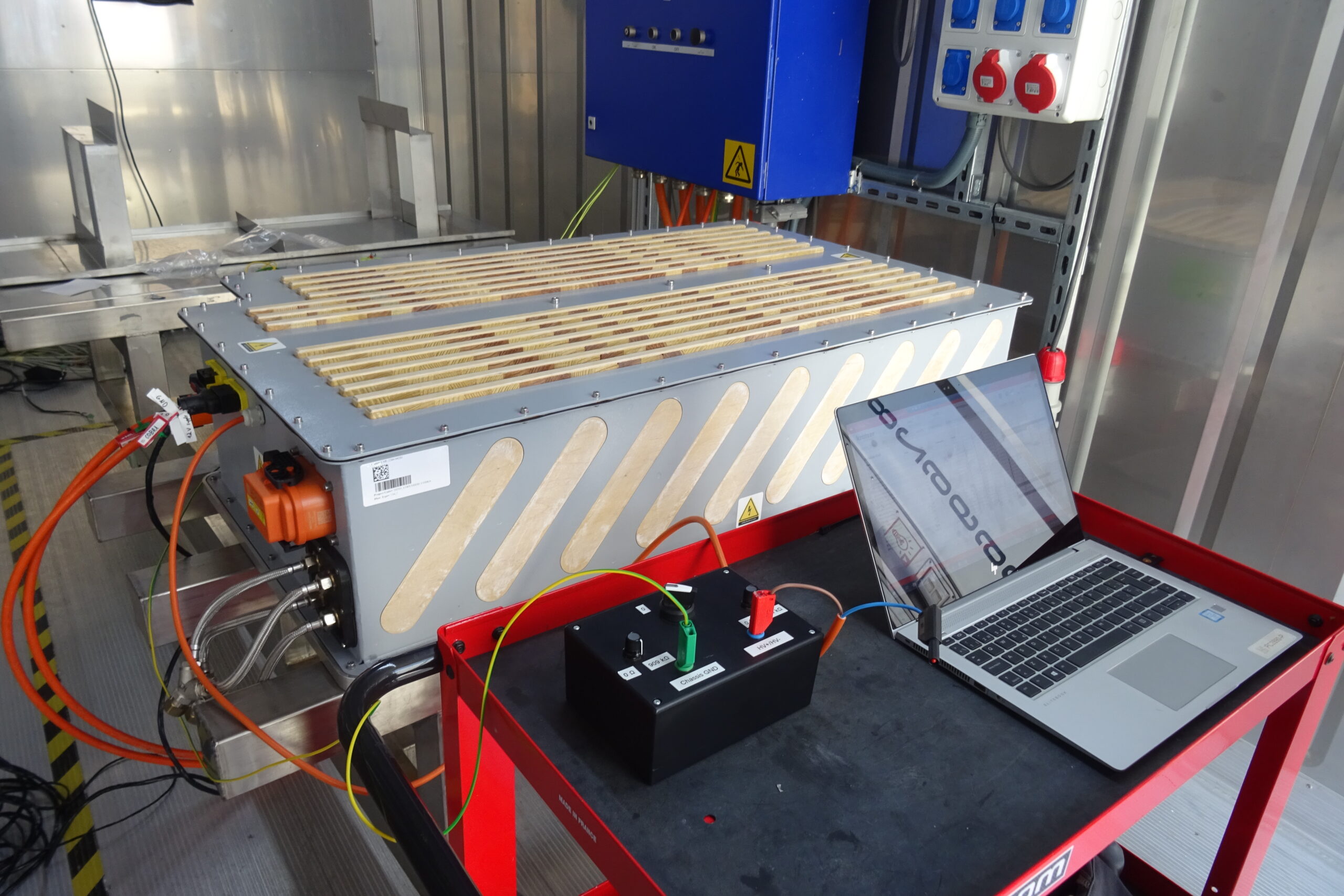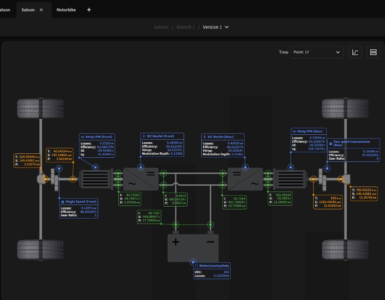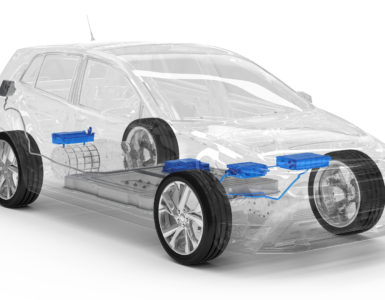The Future Created by Panasonic Automotive Battery Plant in Kansas, USA: Contributing to Increasing EV Adoption and CO2 Reduction.
Panasonic has supplied batteries for a cumulative total of three million electric vehicles (EVs)* and is one of the leading manufacturers of lithium-ion batteries in North America.
CO2 (carbon dioxide) emissions are known to have a significant impact on climate change, and the IEA estimates that approximately one-quarter of the world’s emissions are generated by transportation. The transition to EVs will reduce CO2 emissions from vehicles that run on fossil fuels. In addition to reducing emissions from Panasonic’s own operations, this “reduction contribution” also advances Panasonic’s commitment to fight climate change. The automotive battery business is the flagship of the Panasonic Group’s efforts to confront climate change issues.
Allan Swan, CEO of Panasonic Energy of North America, oversees Panasonic’s operation at the Gigafactory in Nevada, and he is leading the construction of a brand new facility for Panasonic Energy—the world’s largest automotive battery plant—in Kansas. We spoke with him about the role of the Panasonic Group’s battery business.
Automotive Battery Business Making a Major Contribution to Solving Climate Change Issues
What role will Panasonic Energy’s Kansas plant play?
Construction on the cutting-edge, state-of-the-art automotive battery plant in De Soto, Kansas, began in November 2022, and we are targeting start of production in 2025. The plant will increase our production of the 2170 cylindrical lithium-ion battery for electric vehicles, which is in high demand from automotive manufacturers.
Panasonic Group has more than a century of experience making batteries. Our automotive batteries for EVs, which boast high safety, high capacity, and high energy density, have been achieved through technological expertise that we have cultivated over the company’s long history. I am pleased to have a base of operations in Kansas to complement the one in Nevada. With these two plants, we hope to accelerate the spread of EVs and make a significant contribution to reducing CO2 emissions.
Why are you building such a large-scale automotive battery plant in North America?
In North America, the shift to EVs is expected to accelerate against the backdrop of stricter environmental regulations and consumer demand for high-performing, fun-to-drive electric vehicles. In addition, high demand for long-distance travel in the U.S. makes this the market where we can best utilize our high-capacity technology, one of our strengths. If trucks, trains, and buses are included, this is a very large market for automotive batteries.
Many customers who want to use our technology are based in North America, so it makes sense to manufacture EV batteries here. The EV market is also starting to evolve. Our technology for cylindrical lithium-ion batteries is becoming increasingly important. We are in a great situation where our technology matches the needs of the market.
In addition, North America offers “local sourcing” of raw materials mined and processed in a responsible manner, often using renewable energy and other sustainability best practices. As a pioneer in this market, we are making a rapid succession of bold investments to strengthen our position in North America as the leading company driving the adoption of EVs.
By centralizing material procurement and production in North America, where many of our customers are located, we will be able to drastically reduce our supply chain emissions. As fossil fuel-powered vehicles are replaced by EVs, CO2 emissions from vehicles currently on the road can be avoided, as well.
The automotive battery business plays an important role in contributing to solving climate change issues, which we believe must be addressed for the sake of our children, grandchildren, and future generations.
As a Pioneer in the Fight Against Climate Change, We Will Reduce Production-Related CO2 Emissions
What about the environmental impact of battery production?
The production of automotive batteries also involves CO2 emissions, and nearly 90% of these emissions occur during resource extraction, raw material processing, and material logistics—all processes that take place prior to manufacturing. This is why we are committed to reducing the environmental impact of every process, from material procurement to production of batteries to recycling.
Our Kansas plant is designed to operate as a Panasonic-designated net-zero facility. We will minimize the amount of electricity needed for production, and all aspects—from wiring to machinery and equipment—will support CO2 emissions reduction. We also plan to transition to 100% local renewable energy sourcing within the next ten years. Everything about the plant is completely different from anything we have done before.
In terms of raw materials, we are working to procure locally, use materials with lower CFP3, and use more recycled materials. We are actively pursuing new alliances with suppliers that will help us reduce our CFP.
Our efforts today will have an impact on your tomorrow. That’s why everything we do today must be accompanied by solutions for CO2 emissions reduction and climate change issues.
As a producer of automotive batteries for EVs, Panasonic has a responsibility to be a pioneer in the fight against climate change—not only at our own factories, but also in cooperation with our suppliers, to reduce CO2 emissions throughout our supply chain.
3 Carbon Footprint of Products: A number indicating the amount of greenhouse gas emissions generated throughout the entire lifecycle of a product, from raw material procurement to disposal and recycling.
What specific efforts are you making to reduce environmental impact across your supply chain?
Our partnership with Redwood Materials, a U.S. battery recycling company, began in 2019, and together we are recycling waste materials from our Nevada plant. We also signed a purchase agreement for recycled cathode materials and copper foil for EV lithium-ion batteries.
This is a really exciting collaboration and a great example of a supplier operating a plant with carbon emissions in mind. Redwood plans to make completely new materials from recycled batteries, and we will use these materials to produce batteries. Using recycled inputs, increasing local procurement, and promoting recycling-oriented manufacturing will allow us to reduce CO2 emissions during the resource extraction and distribution processes.
In 2023, we signed a purchase agreement with U.S.-based Sila Nanotechnologies for silicon anode materials. In 2024, we will sign a graphite supply agreement with Novonix to supply artificial graphite, the main anode material for EV batteries, from its plant in Tennessee. Novonix’s new technology reduces CO2 emissions during the production of synthetic graphite, helping to accelerate CFP reduction during material production.
In addition, we have signed a graphite supply agreement with Nouveau Monde Graphite, a graphite producer from Canada, where a high percentage of electricity is derived from renewable energy sources, allowing us to procure anode materials with significantly reduced CO2 emissions. By procuring Canadian materials for our U.S. plants, we can shorten the supply chain, significantly reducing distribution-related CO2 emissions.
We are very fortunate to have managed to find suppliers that have the technological know-how to make what we want and help us reduce our CFP. They are like-minded companies that are sincerely facing the challenge of reducing CO2 emissions.
In this way, Panasonic will lead the growth of the battery industry and accelerate our efforts to achieve net-zero emissions4 through diverse partnerships.
The Panasonic GREEN IMPACT Commitment
How do you see the operations of the Kansas plant and the Panasonic Group’s automotive battery business impacting the future of our planet?
Through Panasonic GREEN IMPACT, the Panasonic Group has committed to contributing to the reduction of 93 million tons of CO2 emissions by early 2031. The activities of our Kansas plant and the widespread use of EV batteries will contribute to this goal. It is a big challenge, and we at Panasonic have a responsibility to work toward this goal.
What I find very exciting about working at Panasonic is the sense that we are taking on the challenge of combating global environmental issues like climate change through our initiatives to reduce CO2 emissions. This is true not only for me but for all Group employees: we’re all committed to making products that help in that fight.
Global environmental issues are not just about my generation. We must leave a safe planet for our children, their children, and their children’s children, so that they can continue to enjoy a prosperous life. We must ensure that people can enjoy a happy life on earth for centuries to come. Our current fight to solve the climate change problem will help ensure this.
Our efforts today will have a great impact in mitigating the worst effects of climate change.
READ the latest Batteries News shaping the battery market
The Future Created by Panasonic Automotive Battery Plant in Kansas, USA: Contributing to Increasing EV Adoption and CO2 Reduction. source









